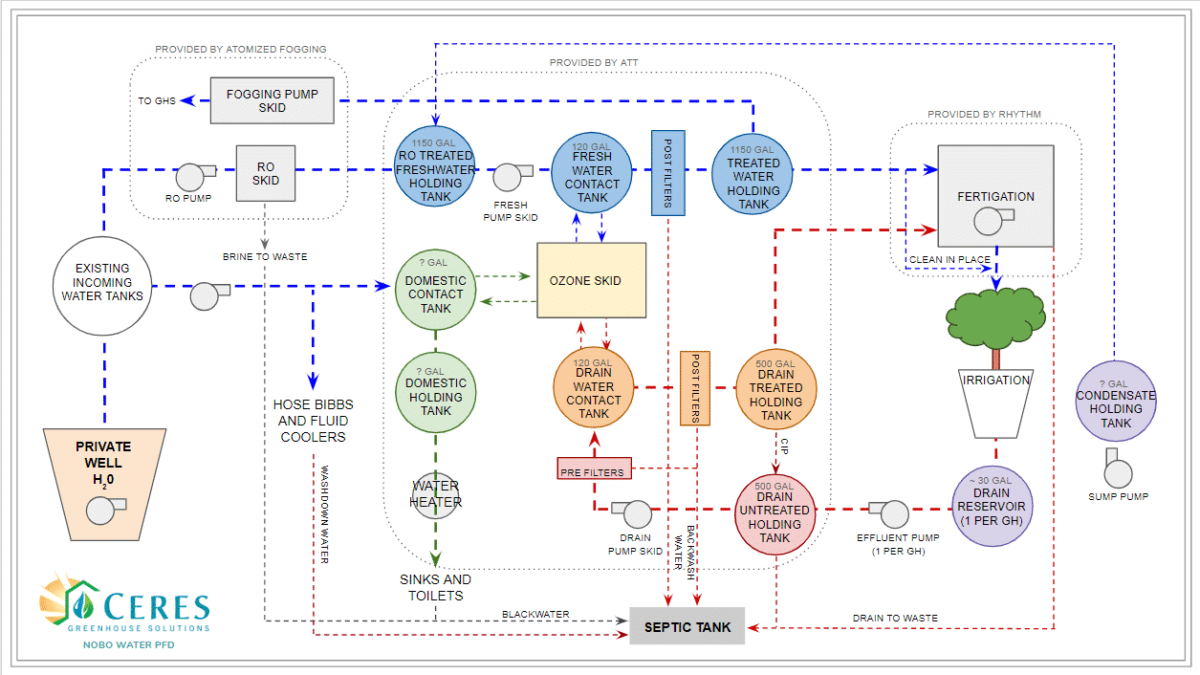Water Treatment Solutions for your Cannabis Greenhouse

Everyone knows living organisms need water to live — and cannabis plants are no exception. In fact, watering cannabis plants carefully is one of the most important responsibilities of any cultivator. From temperature to timing to wastewater management, this guide explores cannabis cultivation water treatment strategies to help your plants thrive. Are you doing everything possible to your water to help your plants thrive?
Watering Cannabis 101: The Basics Every Grower Should Know
Watering fundamentals apply across most grow environments:
- Water when the medium is dry
- Younger plants need less water
- Light and temp affect water needs
- Always check your plants regularly
However, nothing is truly set in stone with watering. Especially if you are cultivating in an extreme environment!
What Is Cannabis Water Treatment?
A big topic within the industry is cannabis water treatment. What does that mean? Water treatment for cannabis is how you utilize and enhance water to grow the best cannabis possible. Some people use water straight from the tap. When serious growers do this, it is typically because the tap or municipal water in their area is ideal for cannabis i.e., soft water with minimized chlorine (often through evaporation). Filtered and tested rainwater is also a common choice. These two types of cannabis cultivation water treatment are low-key, as only slight adjustments are necessary.
Next level water treatment for cannabis utilizes Reverse Osmosis (RO). RO is a water purification process that uses a semi-permeable membrane to separate water molecules from other substances. RO water for cannabis is popular because it is considered ultra-clean. Cal-Mag supplementation and pH adjustment are necessary when using RO water for cannabis, as well as an RO filter for hydro growers or hard/contaminated water sources. Distilled water has similar levels of use as cannabis water treatment.
Other options include water from a well or a spring that can have quality and mineral issues, river water that can easily be contaminated, and bottled water that is expensive, wasteful and potentially mineral-disruptive. Overall, it is important to continually test the water’s quality before using it for cannabis cultivation, no matter the source. This includes the pH and electrical conductivity (EC).
Cannabis Cultivation in Extreme Environments
For those in more extreme environments, cannabis water treatment can be a bit trickier.
- High-altitude grows will experience faster evaporation, which can be combated with designed nutrients and irrigation.
- Deserts usually have arid climates, therefore water treatment for cannabis involves a lot of management like drip irrigation.
- Glacial region growers need to constantly revamp their water schedule due to fluctuations in temperature, humidity and sunlight.
Why Cannabis Waste Water Treatment Matters
No matter where the crop lives, one aspect always needs handling: cannabis waste water. Managing this aspect of cultivation is key to stewardship, as well as staying in compliance with local laws.
Cannabis wastewater can be generated from beginning to end, for example, through cleaning/sanitization rinsing, irrigation runoff, hydroponic excess flushing and extraction residue. Indirect waste water is also an issue, like HVAC condensate with low levels of impurities extracted from the facility’s air, as well as storm water with dirt, debris, oils and trash that washes off buildings and parking lots.
Properly handling wastewater has many benefits:
- Environmental Impact Mitigation: Because cannabis waste water often contains a variety of substances that are harmful to the environment if not managed correctly, such as nutrients, chemicals and organic matter, handling contaminated soil and water sources correctly is essential.
- Resource Conservation: Water scarcity is a serious issue worldwide. Treating cannabis wastewater conserves valuable resources.
- Reputation Management: Status is invaluable in today’s market — by demonstrating a commitment to responsible practices, you differentiate your business as a responsible industry leader.
- Operational Efficiency and Cost Savings: Efficient wastewater treatment systems can reduce the risk of operational disruptions and potential fines associated with non-compliance, as well as boost cost savings by decreasing water consumption and disposal expenses.
- Compliance Obligations: Regulatory bodies often impose strict guidelines; failure to adhere to these regulations can result in harsh penalties and/or legal consequences.
Learn More About Cannabis Cultivation Water Treatment
Want help designing the right cannabis water treatment system for your greenhouse? Register to attend CannaCon, the nation’s leading business-to-business cannabis conference, and connect with industry experts on all things cannabis.
Attend one or all of the 2025 B2B cannabis trade shows:
- June 12-13 in Rochester, NY
- July 18-19 in Lansing, MI
- Aug. 9-10 in St. Paul, MN
Ceres Greenhouse Solutions contributed to this article. Contact Ceres for more information about cannabis water treatment.
Original blog posted March 27, 2020
